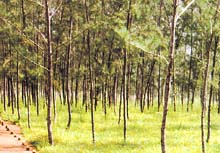Small farms, big gains
 The 1988 National Forest Policy ( nfp ), among other things, envisaged a forest cover of 33.3 per cent of the total land area. Sadly, it has remained just a vision. Down to a paltry 11.7 per cent, there is further threat that this may reach a single digit figure. With its insatiable demand for wood fibre, the pulp and paper mills are also to be blamed for the fast-depleting forest cover.
The 1988 National Forest Policy ( nfp ), among other things, envisaged a forest cover of 33.3 per cent of the total land area. Sadly, it has remained just a vision. Down to a paltry 11.7 per cent, there is further threat that this may reach a single digit figure. With its insatiable demand for wood fibre, the pulp and paper mills are also to be blamed for the fast-depleting forest cover.
The nfp 's ban on the use of government forest land for raw material sourcing has not been able to stop some mills from meeting their fibre needs from these forests. And besides a few, there are hardly any mills who have taken the nfp 's direction of turning towards farm forestry (where small growers supply wood in the open market). While farmers get an income from their land, a regular supply of wood is ensured to the company through farm forestry. At the same time, it discourages cutting of native forests for fuel and other uses by the local community and helps in preserving the natural forest.
Andhra Pradesh Paper Mills Limited and ITC-Bhadrachalam, both in Andhra Pradesh, are two companies who have followed nfp 's suggestion and have benefited from the schemes.
itc -Bhadrachalam has been carrying out farm forestry programmes since 1982. With a view to provide the farmers with a comprehensive package of high-quality nursery stock, technical help, buy-back guarantee and financial assistance for raising and maintaining the plantations, the farm forestry scheme was further strengthened in 1987. In 1997-98, as much as 66.15 per cent of the total raw material requirements was met through these schemes. Between 1987-95, it promoted farm forestry plantations in 1,138 villages in Andhra Pradesh and helped 6,185 farmers to raise farm forestry over 7,441 hectares of land.
appml initiated farm forestry scheme way back in 1977, but it gained momentum in 1989. More than 1,500 hectares of land in six districts have so far been covered under the scheme, and thousands of farmers have benefited from it. The scheme focuses on tree species like subabul and casuarina. The mill has already set up 153 nurseries and prepares seedlings in its own nurseries and distributes it to the farmers.
Related Content
- Employment-intensive land reform in South Africa
- Report of the Committee for Doubling Farmers’ Income: Volume VIII- production enhancement through productivity gains (Ashok Dalwai Committee)
- 'Failing to support GM crops single most damaging element for growth'
- Making globalization work better for the poor through contract farming
- Getting caught with our plants down: the risks of a global crop yield slowdown from climate trends in the next two decades
- Bangladesh State of Environment Report: The Monthly Overview, April 2014
